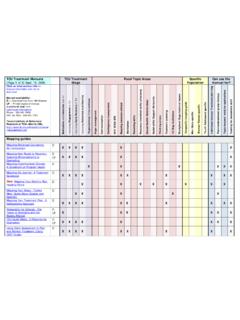Transcription of Compassion Fatigue, Vicarious Trauma & Self Care
1 Vicarious Trauma & Self Care Dr. Judith E. Pierson Psychologist Rehoboth Beach That which makes us good at and committed to this work Is also that which makes it challenging. We do this because we care, because we are naturally empathic, and because many of us have experienced Trauma ourselves. Many titles, similar concept Burnout Compassion Fatigue Secondary Traumatic Stress Vicarious Trauma What is the emotional price of caring ? The stress scores of palliative care workers are almost twice as high as those of newly widowed women and higher than patients newly diagnosed with breast cancer.
2 (Vachon, 1987). In studies of social workers: 39% reported current symptoms of burnout and 75% reported experiencing burnout at some point in their career. (Brown, 2008). 73% of social workers have considered leaving their jobs (Maslach, 2003). Social workers have higher rates of burnout than other helping professionals such as occupational therapists (Brown, 2008). In a study of British social workers 74% were experiencing high levels of anxiety (Lloyd et al., 2002). 62% of experience Child Protective Service workers scored high on a measure of emotional exhaustion.
3 (Anderson, 2001). In a study of substance abuse workers 82% reported high psychological stress 33% were experiencing emotional exhaustion 36% reported diminished feelings of personal accomplishment (Oyefeso et al., 2008). We can be as traumatized as our clients In one study of caseworkers suffered from secondary traumatic stress, while only of Vietnam Vets reported post- traumatic stress disorder (Kulka et al, 1990). Vicarious Trauma Vicarious traumatization is the process through which the therapist's inner experience is negatively transformed through empathic engagement with the client's Trauma material.
4 (McCann & Pearlman, 1990). Signs of Compassion Fatigue &. Vicarious Trauma Hypervigilance Suspicion about people's motives & behaviors Difficulty sleeping, nightmares Intrusive images Anxiety Numbness Inability to experience pleasure Excessive caregiving (on & off the job). Cynicism Feelings of shame about no longer feeling like the warm, compassionate & optimistic person caregiver once was Reactivation of own issues Anger & irritability often due to fatigue Reduced tolerance for what are perceived as others' petty problems . Depression Exhaustion Increased self-criticism Feel estranged from others Challenges to one's cognitive schema's (how one makes sense of the world).
5 Shatters ability to believe the world is a safe, just, controllable, and meaningful place Carry the burden of the terrible knowledge about the underbelly of life Forces examination of life priorities (can be good but disruptive). The Cost of Caring Questionnaire Check-off List What contributes to Vicarious Trauma ? Bearing witness to Trauma (ex. Death of a child or a young parent, or death due to traumatic event). Powerlessness of the patient parallels caregiver's powerlessness if they feel they need to fix it . Childhood experience of parentification creates unrealistic expectations in caregiver Believing self-care is less important than the care we provide others A recognition that Trauma is linked to a larger social/political power imbalances which are not easily remedied.
6 What contributes to burnout Working conditions (big caseloads, do more with less, excessive paperwork, low pay, excluded from administrative decisions, etc.). Patient contributions (multiple problems, economic limitations, hostile transference, suicide threats, fewer program options). Isolation (physical & psychic). The Cost of Caring Questionnaire Questions 2 & 3. Addressing Compassion Fatigue &. Vicarious Trauma Must reduce stress and transform despair that comes with having one's view of the world shattered Normalize, don't pathologize. Figley (95) suggests the best counselors are most at risk because they care.
7 The ABC's Of Addressing Vicarious Trauma : Awareness (of own needs, limits, emotions & resources). Balance (of work taking care of others & taking care of yourself). Connection (to oneself, others & to something larger). Develop cognitive schema's which recognize the miraculous standing next to the tragic Human Compassion is equal to human cruelty and . It is up to each of us to tip the balance. Alice Walker Ask for help when you need it Create an organizational climate that encourages self-care Make self-care a routine, not an infrequent occurrence The Cost of Caring Questionnaire Final check off list Strategies for Refueling Psychologically Journal writing Sharing your feelings Vent emotions in safe ways (throwing ice cubes, play sad music).
8 Visualize a safe & nurturing place and visit it regularly Safe Place Visualization Use affirmations to counter negative thinking: I may not be perfect, but I'm perfectly fine My needs and feelings count too. I will treat myself as kindly as I treat others I will respond to myself with Compassion Circle of Caring Exercise Refueling Physically Massage (simple or full body). Ask for comforting touch Non-should exercise (walking, playing). Create healing/sacred space in your office &. at home Practice radical self-care Create simple pleasures Refueling Socially Make time for pleasing social activities Get out and try new things Ask a friend to just listen for 15.
9 Minutes Gather with kindred spirit (church, support groups, clubs & other organizations). Connect, Connect, Connect Get involved with social activism &. community organizing Join a support group See if others at work would like to start a self-care support group Refueling Spiritually In response to the 3 C's (I didn't cause it, I can't change it, and I can't control it), try the 3 P's (Pause, Pray and Proceed Attend church or engage in a spiritual practice that is meaningful to you Create rituals that speak to you Walk in nature Do whatever brings you closer to something bigger than yourself Read inspirational materials Put inspirational quotes, pictures or images around you Develop a self-care Plan for Yourself Exercise Other things that help Develop realistic expectations for self &.)
10 Employees If possible set aside some time in staff meetings to allow people to share their feelings Don't expect quick fixes Share coping strategies Confirm the positive experiences and ways in which is work enriches your life So how do you sit with a shattered soul Gently, with gracious and deep respect. Patiently, for time stands still for the shattered, and the momentum of healing will be slow at first. With the tender strength that comes from an openness to your own deepest wounding, and to your own deepest healing. Firmly, never wavering in the utmost conviction that evil is powerful, but there is a good that is more powerful still.











